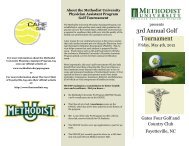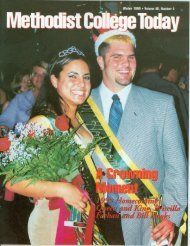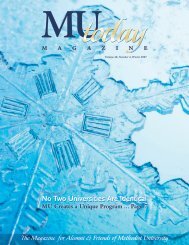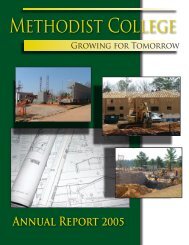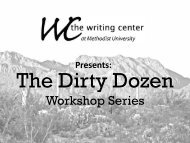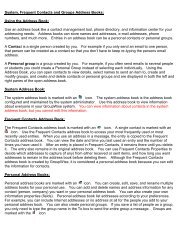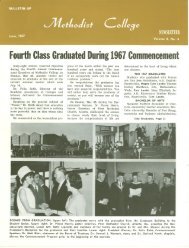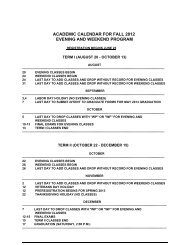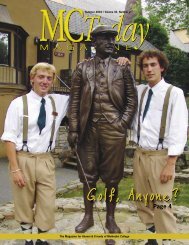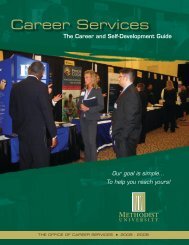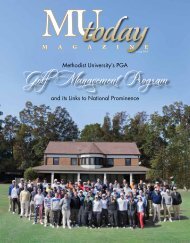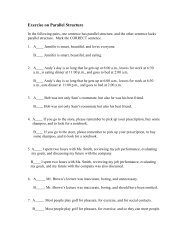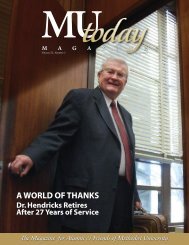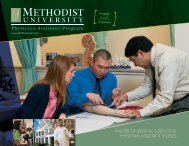to download the 2012-2013 Student - Methodist University
to download the 2012-2013 Student - Methodist University
to download the 2012-2013 Student - Methodist University
Create successful ePaper yourself
Turn your PDF publications into a flip-book with our unique Google optimized e-Paper software.
c. Work for Hire. This term refers <strong>to</strong> intellectual property created by <strong>Methodist</strong> <strong>University</strong> faculty, staff orstudents assigned as part of <strong>the</strong>ir normal paid employment or specially commissioned <strong>to</strong> produce definedworks of intellectual property in which <strong>the</strong> crea<strong>to</strong>r knows property will be used by <strong>Methodist</strong> <strong>University</strong><strong>to</strong> improve its operations or <strong>to</strong> fur<strong>the</strong>r its stated mission and objectives. In cases in which <strong>the</strong> partieshave agreed that ownership will not be on a work-for-hire basis, said ownership must be governed bya separate written agreement that is (a) signed by employer and employee at <strong>the</strong> commencement ofemployment or when <strong>the</strong> work is commissioned and (b) explicit about ownership of intellectual property.[Formulated by <strong>the</strong> ad hoc Copyright Committee and approved by <strong>the</strong> President, April 14, 2005,and by <strong>the</strong> full Faculty, April 22, 2005]Honor CodeIn <strong>the</strong> pursuit of academic studies at <strong>Methodist</strong> <strong>University</strong>, every student has <strong>the</strong> responsibility of obeying <strong>the</strong>Honor Code, which prohibits cheating (including plagiarism), <strong>the</strong>ft, and academic misrepresentation. Eachstudent is responsible for becoming familiar with <strong>the</strong> Honor Code. All work submitted <strong>to</strong> instruc<strong>to</strong>rs must be incompliance with <strong>the</strong> rules of <strong>the</strong> Honor Code and “pledged” as an indication of its conformity <strong>to</strong> <strong>the</strong> rules of <strong>the</strong>Honor Code. Violations of <strong>the</strong> code may be reported by any member of <strong>the</strong> <strong>Methodist</strong> <strong>University</strong> Community.Academic endeavor is undermined by cheating, plagiarism, <strong>the</strong>ft, or lying for academic advantage.The faculty has <strong>the</strong> duty <strong>to</strong> promote an atmosphere of honest learning through its own example as acommunity of scholars but also through <strong>the</strong> establishment and support of a system by which studentscharged with academic wrongdoing can be fairly judged and punished. That system at <strong>Methodist</strong><strong>University</strong> is founded on <strong>the</strong> following principles:1. <strong>Student</strong> civil rights must be protected. Among <strong>the</strong>se are <strong>the</strong> right <strong>to</strong> an orderly hearing following dueprocess, <strong>the</strong> right <strong>to</strong> confront accusers, <strong>the</strong> right <strong>to</strong> avoid self-incrimination, and <strong>the</strong> right <strong>to</strong> presentevidence and call witnesses.2. Grading is <strong>the</strong> prerogative of <strong>the</strong> faculty member, even in cases in which cheating has occurred. Inthose cases, however, in which <strong>the</strong> student is dissatisfied with such a private settlement, fairnessdictates that faculty members accept <strong>the</strong> recommendations of <strong>the</strong> <strong>University</strong> community resultingfrom a hearing process.3. More severe penalties (suspension and expulsion) are <strong>the</strong> responsibility of <strong>the</strong> <strong>University</strong> as a whole,and decisions involving such penalties require <strong>the</strong> participation of <strong>the</strong> faculty, <strong>the</strong> students, and <strong>the</strong>administration.4. A fair and independent appeal process is vital <strong>to</strong> protect student rights and correct abuses.5. Although <strong>the</strong> relationship between student and teacher is essentially a private one and while academicviolations can and should be kept between two parties and resolved <strong>to</strong> <strong>the</strong>ir satisfaction, fairness <strong>to</strong><strong>the</strong> larger community requires that all violations be reported <strong>to</strong> <strong>the</strong> Honor Board. In cases in whichmatters cannot be resolved in this way, <strong>the</strong>y may be appealed, by ei<strong>the</strong>r party, <strong>to</strong> <strong>the</strong> Honor Board.Repeat viola<strong>to</strong>rs face manda<strong>to</strong>ry Honor Board hearings.6. Consistency requires that a relatively small and fixed group hear and judge Honor Board cases.7. The adversary system utilized in litigation is not used in Honor Board cases; ra<strong>the</strong>r, <strong>the</strong> procedureis more conversational in character.Jurisdiction—Plagiarism and cheating in academic work, <strong>the</strong>ft, and academic misrepresentation(lying) are offenses that fall under <strong>the</strong> jurisdiction of <strong>the</strong> <strong>Methodist</strong> <strong>University</strong> Honor Code. <strong>Student</strong>smust understand what <strong>the</strong>se offenses are and how <strong>to</strong> avoid <strong>the</strong>m.Cheating—<strong>Student</strong>s must complete all tests and examinations without help from any o<strong>the</strong>r source.They may not look at ano<strong>the</strong>r student’s paper or at any opened textbook or notebook while taking tests.They may not use any kind of “crib” sheet, i.e., any papers or materials that have helpful informationon <strong>the</strong>m. Possession of a “crib” sheet while taking a test is considered evidence of intention <strong>to</strong> cheat.<strong>Student</strong>s may not ask ano<strong>the</strong>r student for information during a test or give ano<strong>the</strong>r student information.<strong>Student</strong>s may not talk <strong>to</strong> ano<strong>the</strong>r student while a test is being given except with <strong>the</strong> explicit permissionof <strong>the</strong> professor. These rules apply <strong>to</strong> take-home examinations and <strong>to</strong> all o<strong>the</strong>rs unless <strong>the</strong> professorsays o<strong>the</strong>rwise. <strong>Student</strong>s who find a misplaced test question sheet should return it as soon as possible<strong>to</strong> <strong>the</strong> professor whose test it is. Exceptions <strong>to</strong> <strong>the</strong>se rules can be made only by <strong>the</strong> professor.Plagiarism—Anything that is written in a paper, book report, or any o<strong>the</strong>r assignment must be in <strong>the</strong>student’s own words or must properly and fully indicate <strong>the</strong> source(s). Anything that students copy wordfor word from ano<strong>the</strong>r source is a direct quotation. All direct quotations must be shown as such and15



